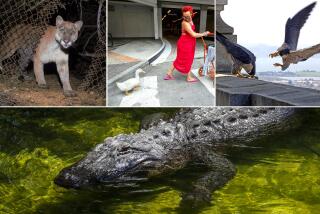Book review: ‘The Life and Opinions of Maf the Dog, and of His Friend Marilyn Monroe’ by Andrew O’Hagan
- Share via
There ought to be a category in each bookstore for charm — the books with a little bit of Old World ease and humor that make you smile. The leaders in this genre would be P.G. Wodehouse (especially the Jeeves books), E.F. Benson (“Mapp and Lucia”) or more recently Elinor Lipman’s “The Family Man” and Helen Simonson’s “Major Pettigrew’s Last Stand.” Into this excellent company we now welcome Andrew O’Hagan’s “The Life and Opinions of Maf the Dog, and of His Friend Marilyn Monroe.”
Maf is (and was in real life) a Maltese bichon, descendant of the poodle, cute as a bug’s ear. Malteses are considered, in Maf’s words, “the aristocrats of the canine world.” He begins life with a breeder in Scotland, in Aviemore. A gardener from Charleston, the home in Sussex of the painters Vanessa Bell (sister to Virginia Woolf) and Duncan Grant, buys Maf from the breeder and takes him to live at Charleston, where he is privy to the comings and goings of the highly neurotic if well-educated Bloomsbury set. From here, he is scooped up by none other than the actress Natalie Wood’s mother, Maria Gurdin (in Maf’s words, “a fan of fandom”), who often picks up dogs in England on her visits and brings them back to Hollywood, where she distributes them among her daughter’s famous friends. Maf is intended as a gift for Wood’s boyfriend, Frank Sinatra, who in turn gives Maf to his other girlfriend, Marilyn Monroe. Monroe names him Maf, short for Mafia Honey.
Maf is wise beyond his years, with good taste in several arenas: interior design, literature, philosophy and politics. He is good-natured, easygoing but dislikes cats (because of their “preference for poetry over prose”). His comments on the human world — London, New York, L.A. — that swirls around him are delivered with sly humor, peppered with cultural references and always level-headed. “People have no head for miracles.” He tells the reader on Page 1: “They are pressed into shape by the force of reality, a curse if you ask me.” Dogs, in contrast, “have none of that fatal human weakness for making large distinctions between what is real and what is imagined. It is all the same more or less. Nature provides a nice example, but it is no longer the place where men live. They live in a place they invented with their own minds.”
One of the great delights of the book, besides Maf’s pithy observations of celebrities, literary critics and politicians, lies in his characterization of the voices and opinions of other dogs and animals. There is an unforgettable scene in which Maf and several other dogs are being transported by car to various recipients. As they are driven through the streets of Los Angeles, the dogs — a sheepdog, a Staffordshire, a wheaten, a schnauzer and a mongrel — carry on a philosophical conversation about the virtues and potential for happiness of men versus animals. Pigeons have New York accents, rats speak a Brooklyn dialect, bees gossip “from flower to flower, a contagion of greyness,” and butterflies speak in the manner of Nabokov: “translucent friend, I am sea-sick with longing. I admire your wings the colour of sapphire and your tiny breath, the ballet of your movements and your pensive air.”
There is something delightful for everyone here. This reader chuckled over the references to books and critics (Maf finds the Trillings a little “sinister”) — others will enjoy the celebrity references — nights with Marilyn at the Copacabana in New York and parties at Peter Lawford’s Santa Monica home; psychoanalysis with Dr. Kris, hair appointments with Kenneth and acting lessons with Lee Strasberg. Marilyn takes Maf everywhere, and he feels (like all males) protective of her vulnerability — empathetic to her naïve efforts to seem intellectual: “I wished I could tell her to leave all that to the mutts: anybody can read a book, but Marilyn could make people dream.”
Maf is good company. As he says to a mongrel who admires his many opinions: “Breeding, old cock. Breeding.”
Salter Reynolds is a Los Angeles writer.
More to Read
Sign up for our Book Club newsletter
Get the latest news, events and more from the Los Angeles Times Book Club, and help us get L.A. reading and talking.
You may occasionally receive promotional content from the Los Angeles Times.










